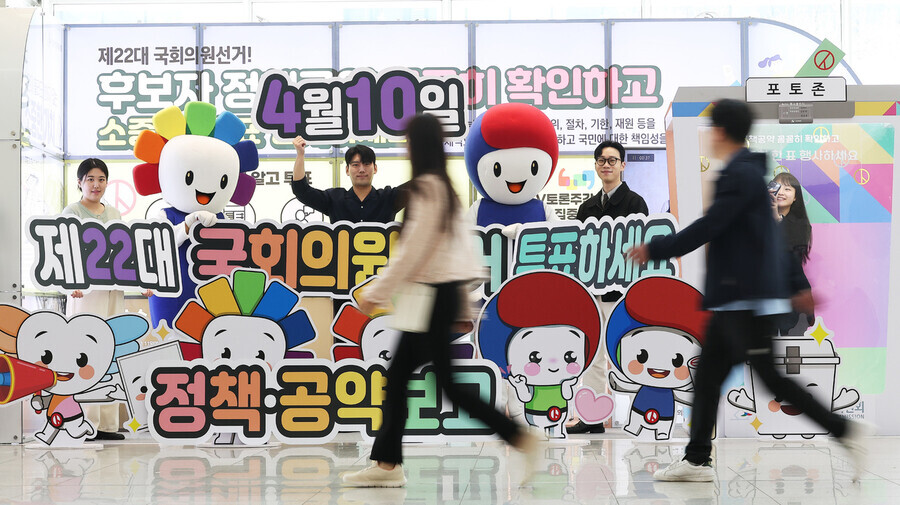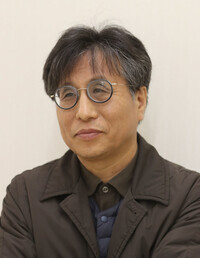hankyoreh
Links to other country sites 다른 나라 사이트 링크
[Column] Can Korean politics escape the vortex?


By Lee Chang-gon, senior staff writer and editorial writer
Not long ago, I met a German political scientist for tea in downtown Seoul. I was meeting Hannes Mosler, a professor at the University of Duisburg-Essen.
Since Mosler has been studying Korean politics for several years now, I asked him point-blank what he thought about Korea’s upcoming parliamentary elections.
Mosler’s response, uttered without a moment’s hesitation, was that the elections represent a giant step backward. “The last presidential election was a giant step backward, too, but this time it’s even worse,” he added.
Why did he think so? “All we’ve seen so far is squabbling between the parties.”
And indeed, the general elections so far have been all about the badges — golden insignia conventionally worn on the breast by Korean lawmakers.
The usual campaign pledges were made at the beginning of the election, but none of them have generated much debate or interest for the public.
I suspect the only thing voters will remember about the political domain in these elections is the commotion over party primaries, the constant formation and dissolution of coalitions, and crass language.
The conflict over the government’s push to increase placements at the country’s medical schools has already lasted for a month and a half with no end in sight.
But the medical school debate isn’t just a dispute between the medical community and the government, as it’s often presented in the news media. Rather, it’s an issue that impinges directly upon the health and safety of the general public, and the sick in particular.
Even though this is an election period — or perhaps because this is an election period, being the perfect time for highly visible political gestures — the parties ought to be rushing to trot out their respective solutions to the dispute. But I haven’t seen the parties engage in any arguments, not to mention serious deliberations, on the topic, either with each other or with the administration.
The reality of politics is that elections are a battlefield in which one side prevails and the other is vanquished. Even so, when the battle devolves into a brawl for badges, we have drifted far from the original mandate of politics.
What is politics supposed to be? Surely it ought to be a collective decision-making process that arrives at solutions for issues affecting all members of society, such as whether more people should be let into medical school. When a country’s political system fails to fulfill that function, then closer scrutiny is in order.
Mosler sought to interpret recent trends in Korean politics through the theoretical lens of “politics of the vortex.” He argues that politics of the vortex, an age-old feature of Korean politics, is why the general elections are turning into a slugfest between the big parties just like the presidential election before them.
In fact, politics of the vortex is a familiar metaphor for any student of political science, and one that has long been used to explain the patterns in contemporary Korean politics. The term originates in “Korea: Politics of the Vortex,” a book by former US diplomat Gregory Henderson that was published by Harvard University Press in 1968.
The term “vortex” here is not used in the ordinary sense of “whirlpool,” or a whirling mass of fluid that sucks things underwater.
Rather, it’s just the opposite — it refers to atomized individuals being swept upwards in a great rush toward the pinnacle of power.
Henderson explained that in contrast with Americans, who value economic gain, Koreans regard power and public positions as the sole determinant of one’s rank in society, producing an especially powerful drive to push forward, along with many others, toward positions of privilege.
Such tendencies, according to Henderson, have taught many Koreans to regard power as the ultimate value on earth, an attitude that has been internalized in Korean political patterns.
Such patterns are especially noticeable in this election season. Scholars, attorneys, journalists, labor activists, NGO activists and even religious figures have been jostling their way toward the center of power. At the peak is the lawmaker’s badge, and especially a badge from one of Korea’s two major parties.
During this process, these would-be lawmakers have gone to unseemly lengths, shucking off their once-touted ideas, philosophies, values and even long-standing party memberships the way a snake sheds its skin. Their ranks include respected members of NGOs and even progressive parties.
Such behaviors explain how a 56-year-old metaphor about Korean politics coined by one foreign scholar has been dusted off by another foreign political scientist in connection with this year’s general elections.
While some aspects of Henderson’s theory of Korean politics are inappropriate for explaining politics today, Mosler is surely not the only one with whom Henderson’s grand insight about the politics of the vortex continues to resonate.
These observations also indicate the questions that Korean society must confront after the general elections, whatever their outcome may be.
Two of those questions are as follows. Why is Korean politics still trapped in the vortex? And why has progressive politics failed repeatedly since democratization?
But we must not limit our questions to politics. I submit that we should pose fundamental questions about values and ethics in all areas of society, including civic groups, the labor movement, the academy and the electorate. After all, the future of our society, which confronts so many challenges, may depend upon how seriously we address these questions.
Please direct questions or comments to [english@hani.co.kr]

Editorial・opinion
![[Column] Season 2 of special prosecutor probe may be coming to Korea soon [Column] Season 2 of special prosecutor probe may be coming to Korea soon](https://flexible.img.hani.co.kr/flexible/normal/500/300/imgdb/original/2024/0426/3317141030699447.jpg) [Column] Season 2 of special prosecutor probe may be coming to Korea soon
[Column] Season 2 of special prosecutor probe may be coming to Korea soon![[Column] Park Geun-hye déjà vu in Yoon Suk-yeol [Column] Park Geun-hye déjà vu in Yoon Suk-yeol](https://flexible.img.hani.co.kr/flexible/normal/500/300/imgdb/original/2024/0424/651713945113788.jpg) [Column] Park Geun-hye déjà vu in Yoon Suk-yeol
[Column] Park Geun-hye déjà vu in Yoon Suk-yeol- [Editorial] New weight of N. Korea’s nuclear threats makes dialogue all the more urgent
- [Guest essay] The real reason Korea’s new right wants to dub Rhee a founding father
- [Column] ‘Choson’: Is it time we start referring to N. Korea in its own terms?
- [Editorial] Japan’s rewriting of history with Korea has gone too far
- [Column] The president’s questionable capacity for dialogue
- [Column] Are chaebol firms just pizza pies for families to divvy up as they please?
- [Column] Has Korea, too, crossed the Rubicon on China?
- [Correspondent’s column] In Japan’s alliance with US, echoes of its past alliances with UK
Most viewed articles
- 1‘We must say no’: Seoul defense chief on Korean, USFK involvement in hypothetical Taiwan crisis
- 2[Editorial] Korea’s surprise Q1 growth requires objective assessment, not blind fanfare
- 3[Column] Season 2 of special prosecutor probe may be coming to Korea soon
- 4Division commander ordered troops to enter raging flood waters before Marine died, survivor says
- 5Is Japan about to snatch control of Line messenger from Korea’s Naver?
- 6[Column] ‘Choson’: Is it time we start referring to N. Korea in its own terms?
- 7[Special report- Part III] Curses, verbal abuse, and impossible quotas
- 8Why Korea shouldn’t welcome Japan’s newly beefed up defense cooperation with US
- 9S. Korea “monitoring developments” after report of secret Chinese police station in Seoul
- 10The dream K-drama boyfriend stealing hearts and screens in Japan